LESSON GOAL
Let’s check our lesson goal.
In this material, you will learn English expressions that can be used when shopping and practice them.
In this material, you will learn English expressions that can be used when shopping and practice them.
このレッスンのゴールを確認しましょう。
この教材では、買い物するときに使う英語を練習をします。
この教材では、買い物するときに使う英語を練習をします。
PART A_1
Please study the picture below. Then, I will ask you some questions.
イラストを見てださい。講師がイラストについて質問します。
PART A_2
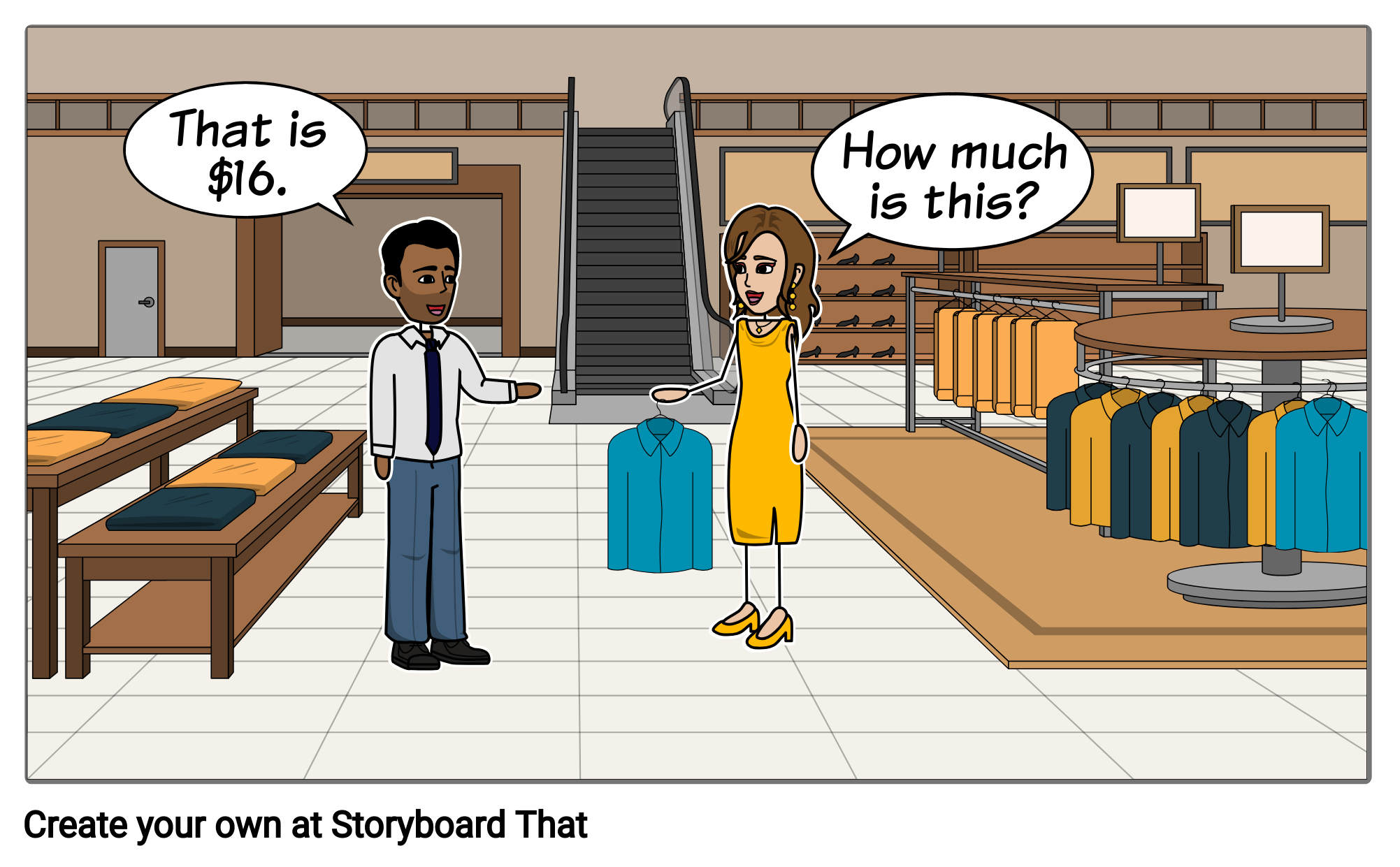
| 1. | How many people are there? |
| Answer: | |
| 2. | How much is the shirt? |
| Answer: |
PART A_3
Now, let us review your answers.
では、あなたの答えを復習してみましょう。その後、修正したあなたの答えを読んでみましょう。
(Please review your student’s answers by sending the correct answers in complete sentences. After that, ask your student to read aloud his or her corrected answers.)
PART B_1
Now, let us read aloud the following sentences. Please repeat after me.
次に文章を音読しましょう。講師につづいて読みましょう。
PART B_2
| 1. | Where can I find ~? |
どこで~を見つけられますか?
|
|
| 2. | How much is ~? |
~はいくらですか?
|
|
| 3. | Do you have ~? |
~はありますか?
|
PART C_1
Let us read the dialogue. I will play Rose and you will play the clerk. After reading it once, we’ll switch roles.
会話文を読みましょう。最初に講師がRose、あなたがclerkの部分を読みます。終わったら交代しましょう。
PART C_2
| Rose: | Excuse me. Do you have color red for this bag? | |
| Clerk: | I’m sorry, miss, but we don’t have color red for that bag. However, colors black, blue, and pink are still available. | |
| Rose: | I’d like the blue bag, please. How much is it? | |
| Clerk: | It’s ten dollars. Here you go. | |
| Rose: | Thank you. By the way, where are the children’s clothes? | |
| Clerk: | The children’s clothes are on the third floor. |
PART D_1
Please answer the questions based on the dialogue.
会話文に関する質問に答えましょう。
PART D_2
| 1. | How much is the blue bag? |
| Answer: | |
| 2. | Where can Rose find the children’s clothes? |
| Answer: |
PART D_3
Now, let us review your answers.
では、あなたの答えを復習してみましょう。その後、修正したあなたの答えを読んでみましょう。
(Please review your student’s answers by sending the correct answers in complete sentences. After that, ask your student to read aloud his or her corrected answers.)
PART E_1
Let us complete the sentences in the dialogue. I will play Rose and you will play the clerk.
空欄を埋めて会話文を読みます。講師はRose、あなたはclerkのパートを読みましょう。
PART E_2
| Rose: | Excuse me. Do you have color red for this bag? | |
| Clerk: | I’m sorry, miss, but we don’t __________ color red for that bag. However, colors black, blue, and pink are still available. | |
| Rose: | I’d like the blue bag, please. How much is it? | |
| Clerk: | It’s __________ dollars. Here you go. | |
| Rose: | Thank you. By the way, where are the children’s clothes? | |
| Clerk: | The children’s __________ are on the third floor. |
PART E_3
Now, let us review your answers.
では、あなたの答えを復習してみましょう。その後、修正したあなたの答えを読んでみましょう。
(Please review your student’s answers by sending the correct answers in complete sentences. After that, ask your student to read aloud his or her corrected answers.)
PART F_1
Now, I will ask you some questions. Please answer in complete sentences.
講師が質問をします。文章で答えましょう。
PART F_2
| 1. | How often do you go shopping? |
| Answer: | |
| 2. | What is the most expensive thing you bought lately? |
| Answer: | |
| 3. | What do you usually buy when you go shopping? |
| Answer: | |
| 4. | Do you buy things that are on sale? |
| Answer: | |
| 5. | Have you ever tried online shopping? |
| Answer: |
PART F_3
Now, let us review your answers.
では、あなたの答えを復習してみましょう。その後、修正したあなたの答えを読んでみましょう。
(Please review your student’s answers by sending the correct answers in complete sentences. After that, ask your student to read aloud his or her corrected answers.)
REVIEW AND FEEDBACK
Now, let us review the things that you learned in this lesson.
ではこのレッスンで学んだことを振り返りましょう。
(Please give a short feedback on how your student did on your class.)
| Grammar 文法 |
Pronunciation 発音 | Vocabulary 単語 |
Comprehension 理解 |
|
|---|---|---|---|---|
 GOOD GOOD |
文法の誤りはほとんどなく、完全な文章で話すことができる | ほとんどの単語をはっきりと正しく発音することができる | 習った表現を適切に使うことができる | 文章を理解し、質問に正しく答えることができる |
 FAIR |
文法の誤りはあるが、完全な文章で話すことができる | 発音の練習が必要な言葉がいくつかある | たまにミスはあるが、習った表現を適切に使うことができる | 文章を完全に理解するのは難しく、質問に正しく答えられないときもある |
 POOR |
文章で話すのは難しく、単語だけで話すことができる | 発音の練習が必要である | 習った単語と表現を少しだけ使うことができる | 文章を理解するのは難しく、質問に答えるのは難しい |
General English Intermediate – Sports
LESSON GOAL
Let’s check our lesson goal.
In this material, you will learn English expressions that can be used when talking about sports and practice them.
In this material, you will learn English expressions that can be used when talking about sports and practice them.
このレッスンのゴールを確認しましょう。
この教材では、スポーツについて話すときに使う英語を練習をします。
この教材では、スポーツについて話すときに使う英語を練習をします。
PART A_1
Please study the picture below. Then, I will ask you some questions.
PART A_2
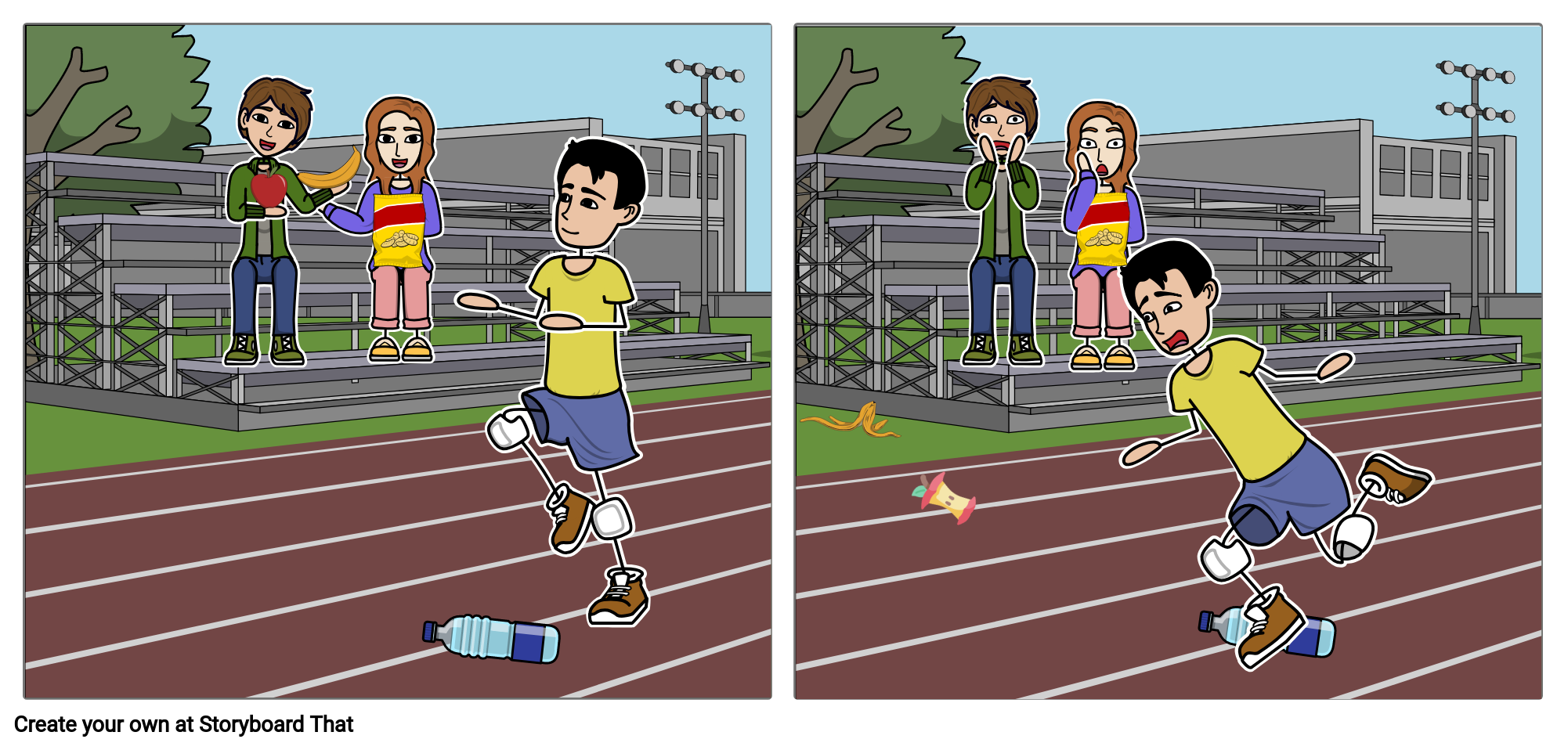
| 1. | Why are there trash on the floor? |
| Answer: | |
| 2. | What will happen to the athlete? |
| Answer: |
PART A_3
Now, let us review your answers.
(Please review your student’s answers by sending the correct answers in complete sentences. After that, ask your student to read aloud his or her corrected answers.)
PART B_1
Now, let us read aloud the following sentences. Please repeat after me.
PART B_2
| 1. | What is your favorite sport? |
| 2. | My favorite sport is ~ |
| 3. | Who is the most athletic ~ |
| 4. | The most athletic ~ |
| 5. | How often do you play ~ |
| 6. | I often play ~ |
PART C_1
Let us read the dialogue. I will play Alex and you will play Jake. After reading it once, we’ll switch roles.
PART C_2
| Alex: | Hi, Jake. I heard that you know how to play soccer. Why don’t you join the Soccer Club? | |
| Jake: | Hi, Alex. I’m actually a member of the Baseball Club. Baseball is my favorite sport. What about you? What is your favorite sport? | |
| Alex: | My favorite sport is basketball. I often play basketball during weekends with the other club members. How often do you play baseball? | |
| Jake: | I often play after class. I need to practice more for our game next week. I want to be as athletic as my teammates. | |
| Alex: | I see. Who is the most athletic in your team? | |
| Jake: | Mac is the most athletic player in our team. I want to be like him. Someday, I want to be a team captain. | |
| Alex: | Just practice harder. I know you can do better than him. Good luck on your game next week. | |
| Jake: | Thank you! I really hope that we’ll win again. |
PART D_1
Please answer the questions based on the dialogue.
PART D_2
| 1. | Why does Alex want to be like Mac? |
| Answer: | |
| 2. | Who is a member of the basketball club? |
| Answer: |
PART D_3
Now, let us review your answers.
(Please review your student’s answers by sending the correct answers in complete sentences. After that, ask your student to read aloud his or her corrected answers.)
PART E_1
Let us complete following sentences. Choose the correct answers from the box below.
PART E_2
| athletic | teammates | members | team captain |
| 1. | Harry is the new __________ of the Tennis Club. |
| 2. | The new __________ of the club should submit their requirements tomorrow. |
| 3. | I am the most __________ player in our team. |
| 4. | Me and my __________ practice volleyball every day. |
PART E_3
Now, let us review your answers.
(Please review your student’s answers by sending the correct answers in complete sentences. After that, ask your student to read aloud his or her corrected answers.)
PART F_1
Now, I will ask you some questions. Please answer in complete sentences.
PART F_2
| 1. | What sport have you tried playing? |
| Answer: | |
| 2. | What sport are you good at? |
| Answer: | |
| 3. | Do you think playing sports is good for the health? Why? |
| Answer: |
PART G_1
Now, you will ask me questions. Please ask me questions using the items given.
PART G_2
| 1. | watching or playing sports |
| Tutor’s answer: | |
| 2. | sports or indoor games |
| Tutor’s answer: |
PART G_3
Now, let us review your answers.
(Please review your student’s answers by sending the correct answers in complete sentences. After that, ask your student to read aloud his or her corrected answers.)
REVIEW AND FEEDBACK
Now, let us review the things that you learned in this lesson.
ではこのレッスンで学んだことを振り返りましょう。
(Please give a short feedback on how your student did on your class.)
| Grammar 文法 |
Pronunciation 発音 | Vocabulary 単語 |
Comprehension 理解 |
|
|---|---|---|---|---|
 GOOD GOOD |
文法の誤りはほとんどなく、完全な文章で話すことができる | ほとんどの単語をはっきりと正しく発音することができる | 習った表現を適切に使うことができる | 文章を理解し、質問に正しく答えることができる |
 FAIR |
文法の誤りはあるが、完全な文章で話すことができる | 発音の練習が必要な言葉がいくつかある | たまにミスはあるが、習った表現を適切に使うことができる | 文章を完全に理解するのは難しく、質問に正しく答えられないときもある |
 POOR |
文章で話すのは難しく、単語だけで話すことができる | 発音の練習が必要である | 習った単語と表現を少しだけ使うことができる | 文章を理解するのは難しく、質問に答えるのは難しい |
レッスン教材に関するアンケートのお願い
レッスン教材の改善・拡充を図ることを目的とし、アンケートを実施しております。
以下のURLからアンケートにお答えいただき、 ご意見・ご要望をお聞かせください。
アンケートはこちら
Travel Intermediate – Sightseeing
LESSON GOAL
Let’s check our lesson goal.
In this material, you will learn English expressions that can be used when sightseeing and practice them.
In this material, you will learn English expressions that can be used when sightseeing and practice them.
このレッスンのゴールを確認しましょう。
この教材では、観光するときに使う英語を練習をします。
この教材では、観光するときに使う英語を練習をします。
PART A_1
Please study the picture below. Then, I will ask you some questions.
PART A_2

| 1. | What are they doing? |
| Answer: | |
| 2. | Who will take the woman’s picture? |
| Answer: |
PART A_3
Now, let us review your answers.
(Please review your student’s answers by sending the correct answers in complete sentences. After that, ask your student to read aloud his or her corrected answers.)
PART B_1
Now, let us read aloud the following sentences. Please repeat after me.
PART B_2
| 1. | What places do you recommend? |
| 2. | I recommend ~ |
| 3. | How much is the admission fee? |
| 4. | The admission fee is ~ |
| 5. | Could you take a photo of me? |
| 6. | Sure, no problem! |
PART C_1
Let us read the dialogue. I will play David and you will play Emma. After reading it once, we’ll switch roles.
PART C_2
| David: | Good morning, Emma. How’s your first day here in the Philippines? | |
| Emma: | Good morning, David. It’s okay. I want to go sightseeing today. What places do you recommend? | |
| David: | I recommend visiting Manila Bay and Rizal Park. The best time to visit these places is in the afternoon so that you can watch the sunset. I can tour you around if you want. | |
| Emma: | Really? That’s very nice of you. By the way, your friend told me that there’s an art gallery nearby. How much is the admission fee? | |
| David: | The admission fee is one dollar. However, the art gallery is closed today, but you can visit it tomorrow. It will be open from 10 a.m. to 4 p.m. | |
| Emma: | Okay. Could you take photos of me while we tour around? I’d like to show it to my parents. They’re in Japan. | |
| David: | Sure, no problem! By the way, we have to ride a jeepney to go to Manila. It’s our country’s common means of transportation. | |
| Emma: | Okay. I’ve seen jeepneys on my way here yesterday and I can’t wait to ride one. |
PART D_1
Please answer the questions based on the dialogue.
PART D_2
| 1. | What are the two places that David recommends Emma to visit? |
| Answer: | |
| 2. | How much is the art gallery’s admission fee? |
| Answer: |
PART D_3
Now, let us review your answers.
(Please review your student’s answers by sending the correct answers in complete sentences. After that, ask your student to read aloud his or her corrected answers.)
PART E_1
Let us complete following sentences. Choose the correct answers from the box below.
PART E_2
| visit | admission fee | recommend | transportation |
| 1. | Train is one of the most common means of __________. |
| 2. | I __________ that you go to Universal Studios Japan in October. |
| 3. | How much is the __________ at the park? |
| 4. | Which place do you want to __________ tomorrow? |
PART E_3
Now, let us review your answers.
(Please review your student’s answers by sending the correct answers in complete sentences. After that, ask your student to read aloud his or her corrected answers.)
PART F_1
Now, I will ask you some questions. Please answer in complete sentences.
PART F_2
| 1. | What are the most famous sightseeing spots in your country? |
| Answer: | |
| 2. | What do you think is the most interesting place in the world? |
| Answer: | |
| 3. | Which do you prefer, sightseeing in your own country or abroad? |
| Answer: |
PART G_1
Now, you will ask me questions. Please ask me questions using the items given.
PART G_2
| 1. | sightseeing spots in the Philippines |
| Tutor’s answer: | |
| 2. | place/s you want to visit |
| Tutor’s answer: |
PART G_3
Now, let us review your answers.
(Please review your student’s answers by sending the correct answers in complete sentences. After that, ask your student to read aloud his or her corrected answers.)
REVIEW AND FEEDBACK
Now, let us review the things that you learned in this lesson.
ではこのレッスンで学んだことを振り返りましょう。
(Please give a short feedback on how your student did on your class.)
| Grammar 文法 |
Pronunciation 発音 | Vocabulary 単語 |
Comprehension 理解 |
|
|---|---|---|---|---|
 GOOD GOOD |
文法の誤りはほとんどなく、完全な文章で話すことができる | ほとんどの単語をはっきりと正しく発音することができる | 習った表現を適切に使うことができる | 文章を理解し、質問に正しく答えることができる |
 FAIR |
文法の誤りはあるが、完全な文章で話すことができる | 発音の練習が必要な言葉がいくつかある | たまにミスはあるが、習った表現を適切に使うことができる | 文章を完全に理解するのは難しく、質問に正しく答えられないときもある |
 POOR |
文章で話すのは難しく、単語だけで話すことができる | 発音の練習が必要である | 習った単語と表現を少しだけ使うことができる | 文章を理解するのは難しく、質問に答えるのは難しい |
レッスン教材に関するアンケートのお願い
レッスン教材の改善・拡充を図ることを目的とし、アンケートを実施しております。
以下のURLからアンケートにお答えいただき、 ご意見・ご要望をお聞かせください。
アンケートはこちら
Y_NT3_Lesson-8
PART A_1
Let’s introduce ourselves to each other.
自己紹介をしましょう。
PART A_2
My name is ________. Nice to meet you. What is your name?
PART A_3
I am ________. Nice to meet you too. Let’s start our lesson.
PART B_1
We will read aloud the words below. Please repeat after me. I will check your pronunciation.
単語を音読します。講師に続いて読みましょう。講師は発音を確認します。
(Please send the mispronounced words and expressions to your student.)
PART B_2
| publish | 出版する |
| village | 村 |
| surrounded | 囲っている |
| visit | 訪問する、訪れる |
| vehicles | 乗り物 |
| catch | つかまえる |
PART B_3
Now, let’s review some words from part B_2.
ではいくつかの単語を復習してみましょう。
(Please review the mispronounced words and expressions from part B_2.)
PART B_4
PART C_1
We will read aloud the sentences below. I will check your pronunciation and intonation.
文を読みます。講師が発音、イントネーションについて確認します。
(Please send the mispronounced words and expressions to your student.)
PART C_2
| 1. | He was the one who published a book last year. |
| 2. | Is he from the same village in which you were born in? |
| 3. | I am looking forward to the day when you can visit our village. |
| 4. | Let me know when you will be free. |
| 5. | That’s why we need to leave the house early. |
| 6. | Let’s meet at a coffee shop where my cousin works. |
PART C_3
Now, let’s review some words and sentences from part C_2.
ではいくつかの単語、文章を復習してみましょう。
(Please review the mispronounced words and sentences from part C_2.)
PART C_4
PART D_1
We will read aloud the dialogue below. I will check your pronunciation and intonation.
会話文を読みます。講師が発音、イントネーションについて確認します。
(Please send the mispronounced words and expressions that need improvements to your student.)
PART D_2
| TUTOR: | Do you know who Mr. Baker is? |
| STUDENT: | Yes. He was the one who published a book last year. |
| TUTOR: | Really? Is he from the same village in which you were born in? |
| STUDENT: | Yes, he is. I am looking forward to the day when you can visit our village. Our village is surrounded by restaurants where we can eat. Let me know when you will be free. |
| TUTOR: | I can visit your house next week. What are the available vehicles going to your village? |
| STUDENT: | We may ride a train. But we have to catch the first train. That’s why we need to leave the house early. |
| TUTOR: | Okay. Let’s meet at a coffee shop where my cousin works. |
| STUDENT: | Sure. |
PART D_3
Now, let’s review some words and sentences from part D_2.
ではいくつかの単語、文章を復習してみましょう。
(Please review the mispronounced words and sentences that need improvements from part D_2.)
PART D_4
PART E_1
You will answer the questions below by using the grammar topics you learned.
I will check if your sentences are complete and if the grammar is correct.
I will check if your sentences are complete and if the grammar is correct.
講師に質問しますので、習った文法を使って答えましょう。講師は文法と完全な文章であるかを確認します。
(Please send the sentences that need grammar corrections to your student.)
PART E_2
| 1. | What country were you born in? |
| Answer: | |
| 2. | What places in your city/town are mostly visited by foreign tourists? |
| Answer: | |
| 3. | What places have you visited which are far from your city/town? |
| Answer: | |
| 4. | Would you like to study at a university in Canada? |
| Answer: | |
| 5. | Do you have a friend who lives abroad? |
| Answer: | |
| 6. | Do you know someone who has published a book? |
| Answer: |
PART E_3
Now, let’s review your answers.
では、あなたの答えを復習してみましょう。その後、修正したあなたの答えを読んでみましょう。
(Please review your student’s answers by sending the correct answers in complete sentences. After that, ask your student to read aloud his or her corrected answers.)
PART E_4
PART F_1
Now, you will ask me the questions below using the grammar topics you learned.
I will check if your sentences are complete and if the grammar is correct.
I will check if your sentences are complete and if the grammar is correct.
今度は、あなたが講師に質問します。習った文法を使って文を作りましょう。
講師は文法と完全な文章であるかを確認します。
講師は文法と完全な文章であるかを確認します。
(Please send the sentences that need grammar corrections to your student.)
PART F_2
| Student: | ? | |
| Tutor: | The last time that I visited the hospital was last month. | |
| Student: | ? | |
| Tutor: | The first day my best friend and I met was when we were in elementary school. | |
| Student: | ? | |
| Tutor: | I am looking forward to watching a movie that will be shown next week. | |
| Student: | ? | |
| Tutor: | The last time I ate at my favorite restaurant was last Monday. | |
| Student: | ? | |
| Tutor: | I would like to publish a book which I wrote. | |
| Student: | ? | |
| Tutor: | The school year in my country starts in June. |
PART F_3
Now, let’s review your answers.
では、あなたの答えを復習してみましょう。その後、修正したあなたの答えを読んでみましょう。
(Please review your student’s answers by sending the correct answers in complete sentences. After that, ask your student to read aloud his or her corrected answers.)
PART F_4
PART G_1
Let’s do a free talk about the following topics.
フリートークをしましょう。
(Please do a free talk if you have time left.)
PART G_2
What traditional temple have you visited?
Do you have a classmate who is from the same village as you?
Do you have a classmate who is from the same village as you?
PART G_3
Y_NT3_Lesson-10
PART A_1
Let’s introduce ourselves to each other.
自己紹介をしましょう。
PART A_2
My name is ________. Nice to meet you. What is your name?
PART A_3
I am ________. Nice to meet you too. Let’s start our lesson.
PART B_1
We will read aloud the words below. Please repeat after me. I will check your pronunciation.
単語を音読します。講師に続いて読みましょう。講師は発音を確認します。
(Please send the mispronounced words and expressions to your student.)
PART B_2
| stood | stand の過去形・過去分詞 |
| reporter | 新聞記者、リポーター |
| charming | すてきな |
| come across | に出くわす |
| quit | やめる |
| located | 位置して |
PART B_3
Now, let’s review some words from part B_2.
ではいくつかの単語を復習してみましょう。
(Please review the mispronounced words and expressions from part B_2.)
PART B_4
PART C_1
We will read aloud the sentences below. I will check your pronunciation and intonation.
文を読みます。講師が発音、イントネーションについて確認します。
(Please send the mispronounced words and expressions to your student.)
PART C_2
| 1. | I’d also like to get my notebook signed by my favorite actor. |
| 2. | He stood surrounded by a lot of people after the movie. |
| 3. | Located in the exit, the reporters asked for interviews. |
| 4. | Having quit my job, I had plenty of time to watch movies. |
| 5. | Walking to the movie theater, I came across an actor. |
| 6. | I saw a charming actor. |
PART C_3
Now, let’s review some words and sentences from part C_2.
ではいくつかの単語、文章を復習してみましょう。
(Please review the mispronounced words and sentences from part C_2.)
PART C_4
PART D_1
We will read aloud the dialogue below. I will check your pronunciation and intonation.
会話文を読みます。講師が発音、イントネーションについて確認します。
(Please send the mispronounced words and expressions that need improvements to your student.)
PART D_2
| TUTOR: | How was the movie? |
| STUDENT: | It was great! I saw a charming actor in the movie theater. |
| TUTOR: | That’s nice. How did it happen? |
| STUDENT: | Walking to the movie theater, I came across an actor. He stood surrounded by a lot of people after the movie. |
| TUTOR: | Wow! Were there many reporters? |
| STUDENT: | Yes. Located in the exit, the reporters asked for interviews. |
| TUTOR: | I see. Having quit my job, I had plenty of time to watch movies. So, I will go with you next time. |
| STUDENT: | Sure! I’d also like to get my notebook signed by my favorite actor. |
PART D_3
Now, let’s review some words and sentences from part D_2.
ではいくつかの単語、文章を復習してみましょう。
(Please review the mispronounced words and sentences that need improvements from part D_2.)
PART D_4
PART E_1
You will answer the questions below by using the grammar topics you learned.
I will check if your sentences are complete and if the grammar is correct.
I will check if your sentences are complete and if the grammar is correct.
講師に質問しますので、習った文法を使って答えましょう。講師は文法と完全な文章であるかを確認します。
(Please send the sentences that need grammar corrections to your student.)
PART E_2
| 1. | Do you know a movie made in Japan? | |
| Answer: | ||
| 2. | Do you like watching movies translated into Japanese? | |
| Answer: | ||
| 3. | Do you often see people singing a song on the streets? | |
| Answer: | ||
| 4. | Have you watched a boring movie? | |
| Answer: | ||
| 5. | Have you seen foreigners speaking Japanese very well? | |
| Answer: | ||
| 6. | What changes have you experienced since you entered junior high school? | |
| Answer: | Having entered junior high school, |
PART E_3
Now, let’s review your answers.
では、あなたの答えを復習してみましょう。その後、修正したあなたの答えを読んでみましょう。
(Please review your student’s answers by sending the correct answers in complete sentences. After that, ask your student to read aloud his or her corrected answers.)
PART E_4
PART F_1
Now, you will ask me the questions below using the grammar topics you learned.
I will check if your sentences are complete and if the grammar is correct.
I will check if your sentences are complete and if the grammar is correct.
今度は、あなたが講師に質問します。習った文法を使って文を作りましょう。
講師は文法と完全な文章であるかを確認します。
講師は文法と完全な文章であるかを確認します。
(Please send the sentences that need grammar corrections to your student.)
PART F_2
| Student: | ? | |
| Tutor: | Yes, I have seen a Japanese speaking English very well. | |
| Student: | ? | |
| Tutor: | American movies are often watched in the Philippines. | |
| Student: | ? | |
| Tutor: | The most exciting movie I have watched is a superhero movie. | |
| Student: | ? | |
| Tutor: | Having watched Japanese movies, I got interested in Japanese culture. | |
| Student: | ? | |
| Tutor: | I like watching movies translated into my local language. | |
| Student: | ? | |
| Tutor: | I don’t know any Hollywood movies shot in Manila. |
PART F_3
Now, let’s review your answers.
では、あなたの答えを復習してみましょう。その後、修正したあなたの答えを読んでみましょう。
(Please review your student’s answers by sending the correct answers in complete sentences. After that, ask your student to read aloud his or her corrected answers.)
PART F_4
PART G_1
Let’s do a free talk about the following topics.
フリートークをしましょう。
(Please do a free talk if you have time left.)
PART G_2
Have you watched scary movies?
What do you usually do in summer vacation?
What do you usually do in summer vacation?
PART G_3
Y_CⅡ_Lesson-1-2
PART A_1
We will read aloud the words below. Please repeat after me. I will check your pronunciation.
単語を音読します。講師に続いて読みましょう。講師は発音を確認します。
(Please send the mispronounced words and expressions to your student.)
PART A_2
| along the way | 途中で |
| sleeping bag | 寝袋 |
| make fun of~ | からかう |
| turn in~ (to…) | 警察に届ける |
| quit | やめる |
| belongings | 持参品 |
PART A_3
Now, let’s review some words from part A_2.
ではいくつかの単語を復習してみましょう。
(Please review the mispronounced words and expressions from part A_2.)
PART A_4
PART A_5
Now, please look at the picture below. Please describe 3 people.
以下の写真を見てください。3人の人物が何をしているか描写してみましょう。
PART A_6

| 1. | . | |
| 2. | . | |
| 3. | . |
PART A_7
Now, let’s review some words from part A_6.
ではいくつかの単語を復習してみましょう。
(Please review the mispronounced words and expressions from part A_6.)
PART A_8
PART B_1
Please read aloud the passage below. I will check your pronunciation and intonation.
文章を読みます。講師が発音、イントネーションについて確認します。
(Please send the mispronounced words and expressions to your student.)
PART B_2
Hirata Oriza, the person who traveled around the world on a bike, had gained many experiences along the way. When he stayed in Spain, it rained almost every day. He even woke up in a wet sleeping bag, so he decided to move into a hotel. There was also a situation in England when children threw stones at him and sang songs that make fun of people from Asia. In his thoughts, he also had good friends in England, so he chose not to get angry. In France, he lost his passport. A few days later, someone turned it in the police. He was lucky in France. However, in Milan, he almost quit because most of his belongings were stolen. He did not quit the tour because he remembered all the honest people he met along the way.
After the tour, he was finally home safe and sound. People often ask him what he learned from his trip, but he could not answer their questions. He just said he learned something that he can use in the future. He believed there were still long stretches of winding roads in front of him. However, he realized that he became a totally different person after his trip around the world.
PART B_3
Now, let’s review some words and sentences from part B_2.
ではいくつかの単語、文章を復習してみましょう。
(Please review the mispronounced words and sentences from part B_2.)
PART B_4
PART C_1
I will ask the following questions. Please answer based on the passage. I will check if your sentences are complete and if the grammar is correct.
講師が以下の質問をします。読んだ内容をもとに答えましょう。講師は文法と完全な文章で答えられているかを確認します。
(Please send the sentences that need grammar corrections to your student.)
PART C_2
| 1. | Why did he decide to move into a hotel in Spain? | |
| Answer: | . | |
| 2. | What did children do to him in England? | |
| Answer: | . | |
| 3. | What happened to him in France? | |
| Answer: | . | |
| 4. | Why did he almost quit the tour in Milan? | |
| Answer: | . | |
| 5. | What did he realize after his trip around the world? | |
| Answer: | . |
PART C_3
Now, let’s review your answers.
では、あなたの答えを復習してみましょう。その後、修正したあなたの答えを読んでみましょう。
(Please review your student’s answers by sending the correct answers in complete sentences. After that, ask your student to read aloud his or her corrected answers.)
PART C_4
PART D_1
Please choose a word to complete each sentence. Then, read aloud the sentences.
言葉を選んで文章を完成させましょう。そのあと音読しましょう。
PART D_2
turn in~ (to…)
along the way
quit
belongings
make fun of
| 1. | He is planning to __________ his part-time job next year. |
| 2. | I have all of my ___________ in my backpack. |
| 3. | You should not ______________ old people. |
| 4. | She was able to _________ the lost wallet ____ the owner. |
| 5. | The man has dropped his house key _____________. |
PART D_3
Now, let’s review some words from part D_2.
ではいくつかの単語を復習してみましょう。
(Please review the mispronounced words and expressions from part D_2.)
PART D_4
PART E_1
Please answer the following question. I will check if your sentences are complete and if the grammar is correct.
講師が質問しますので答えましょう。講師は文法と完全な文章であるかを確認します。
PART E_2
| 1. | Have you ever slept in a sleeping bag? When? |
| Answer: | |
| 2. | What can you see along the way to your house from your school? |
| Answer: | |
| 3. | What belongings do you always have in your bag? |
| Answer: | |
| 4. | Have you turned in lost things to the police? |
| Answer: | |
| 5. | Have you ever quit a game? Why? |
| Answer: | |
| 6. | When traveling, what do you usually do along the way? |
| Answer: | |
| 7. | Who do you depend on when you are having a hard time? |
| Answer: |
PART E_3
Now, let’s review your answers.
では、あなたの答えを復習してみましょう。その後、修正したあなたの答えを読んでみましょう。
(Please review your student’s answers by sending the correct answers in complete sentences. After that, ask your student to read aloud his or her corrected answers.)
PART E_4
Y_NT1_Lesson-1-2
PART A_1
Let’s introduce ourselves to each other.
自己紹介をしましょう。
PART A_2
My name is ________. What is your name?
PART A_3
I am ________. Nice to meet you. Let’s start our lesson.
PART B_1
We will read aloud the words below. Please repeat after me. I will check your pronunciation.
単語を音読します。講師に続いて読みましょう。講師は発音を確認します。
(Please send the mispronounced words and expressions to your student.)
PART B_2
| friend | (JP) |
| student | (JP) |
| special | (JP) |
| gift | (JP) |
| math | (JP) |
PART B_3
Now, let’s review some words from part B_2.
ではいくつかの単語を復習してみましょう。
(Please review the mispronounced words and expressions from part B_2.)
PART B_4
PART C_1
We will read aloud the sentences below. I will check your pronunciation and intonation.
文を読みます。講師が発音、イントネーションについて確認します。
(Please send the mispronounced words and expressions to your student.)
PART C_2
| 1. | This is my friend Jin. |
| 2. | He is from Vietnam. |
| 3. | That is Mr. Brown. |
| 4. | What is this? |
| 5. | Who is that man? |
PART C_3
Now, let’s review some words and sentences from part C_2.
ではいくつかの単語、文章を復習してみましょう。
(Please review the mispronounced words and sentences from part C_2.)
PART C_4
PART D_1
We will read aloud the dialogue below. I will check your pronunciation and intonation.
会話文を読みます。講師が発音、イントネーションについて確認します。
(Please send the mispronounced words and expressions to your student.)
PART D_2
|
TUTOR:
|
Hi, my name is Sarah. I’m a new student. |
|
STUDENT:
|
Nice to meet you, Sarah. I’m Mina and this is my friend Jin. He is from Vietnam. |
|
TUTOR:
|
Nice to meet you too, Mina and Jin. Something is on my desk. What is this? |
|
STUDENT:
|
This is a special gift for new students. |
|
TUTOR:
|
Wow, that’s great! Who is that man? |
|
STUDENT:
|
That is Mr. Brown. He is our math teacher. Our math class will start now. |
PART D_3
Now, let’s review some words and sentences from part D_2.
ではいくつかの単語、文章を復習してみましょう。
(Please review the mispronounced words and sentences from part D_2.)
PART D_4
PART E_1
Now, you will answer the questions below using the grammar topics you learned.
I will check if your sentences are complete and if the grammar is correct.
I will check if your sentences are complete and if the grammar is correct.
今度は、あなたが講師に質問します。習った文法を使って文を作りましょう。
講師は文法と完全な文章であるかを確認します。
講師は文法と完全な文章であるかを確認します。
(Please send the sentences that need grammar corrections to your student.)
PART E_2

| 1. | Who is that man? | |
| (JP) | ||
| Answer: | . |
PART E_3

| 2. | What is this? | |
| (JP) | ||
| Answer: | . |
PART E_4

| 3. | Where is she from? | |
| (JP) | ||
| Answer: | . |
PART E_5

| 4. | Who is your friend? | |
| (JP) | ||
| Answer: | . |
PART E_6
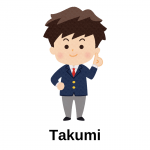
| 5. | Who is that? | |
| (JP) | ||
| Answer: | . |
PART E_7

| 6. | What is this? | |
| (JP) | ||
| Answer: | . |
PART E_8
Now, let’s review your answers.
では、あなたの答えを復習してみましょう。その後、修正したあなたの答えを読んでみましょう。
(Please review your student’s answers by sending the correct answers in complete sentences. After that, ask your student to read aloud his or her corrected answers.)
PART E_9
PART F_1
Now, you will ask me questions by translating the following Japanese sentences into English sentences. I will check if your sentences are complete and if the grammar is correct.
今度は、あなたが講師に質問します。習った文法を使って文を作りましょう。
講師は文法と完全な文章であるかを確認します。
講師は文法と完全な文章であるかを確認します。
(Please send the sentences that need grammar corrections to your student.)
PART F_2
| 1. | What do you usually do with your friend? | |
| Answer: | . | |
| 2. | What was the best gift you received on your birthday? | |
| Answer: | . | |
| 3. | What special occasions do you enjoy? | |
| Answer: | . | |
| 4. | Where is your English teacher from? | |
| Answer: | . | |
| 5. | Why do you think some students do not like math? | |
| Answer: | . | |
| 6. | Who is your history teacher? | |
| Answer: | . |
PART G_1
Let’s do a free talk about the following topic.
フリートークをしましょう。
(Please do a free talk if you have time left.)
PART G_2
What country is your friend from?
Who is the person beside you?
Who is the person beside you?
Y_NT1_Lesson-13-1
PART A_1
Let’s introduce ourselves to each other.
自己紹介をしましょう。
PART A_2
My name is ________. What is your name?
PART A_3
I am ________. Nice to meet you. Let’s start our lesson.
PART B_1
We will read aloud the words below. Please repeat after me. I will check your pronunciation.
単語を音読します。講師に続いて読みましょう。講師は発音を確認します。
(Please send the mispronounced words and expressions to your student.)
PART B_2
| supermarket | スーパーマーケット |
| near | 近く |
| behind | 後ろに |
| bottle | 瓶 |
| bread | パン |
PART B_3
Now, let’s review some words from part B_2.
ではいくつかの単語を復習してみましょう。
(Please review the mispronounced words and expressions from part B_2.)
PART B_4
PART C_1
We will read aloud the sentences below. I will check your pronunciation and intonation.
文を読みます。講師が発音、イントネーションについて確認します。
(Please send the mispronounced words and expressions to your student.)
PART C_2
| 1. | Is there a supermarket near the tennis court? |
| 2. | I need sugar and a bottle of milk. |
| 3. | There is a supermarket behind the tennis court. |
| 4. | There are only a few people at the tennis court today. |
| 5. | There was a little rain this morning. |
PART C_3
Now, let’s review some words and sentences from part C_2.
ではいくつかの単語、文章を復習してみましょう。
(Please review the mispronounced words and sentences from part C_2.)
PART C_4
PART D_1
We will read aloud the dialogue below. I will check your pronunciation and intonation.
会話文を読みます。講師が発音、イントネーションについて確認します。
(Please send the mispronounced words and expressions to your student.)
PART D_2
|
TUTOR:
|
Is there a supermarket near the tennis court? |
|
STUDENT:
|
Yes. There is a supermarket behind the tennis court. |
|
TUTOR:
|
Thanks. I need sugar and a bottle of milk. I will bake some cookies later. |
|
STUDENT:
|
I see. I will go with you. I also need to buy bread. |
|
TUTOR:
|
Let us go to the supermarket after the game. It is good that there are only a few people at the tennis court today. |
|
STUDENT:
|
There was a little rain this morning. I think that’s the reason. |
PART D_3
Now, let’s review some words and sentences from part D_2.
ではいくつかの単語、文章を復習してみましょう。
(Please review the mispronounced words and sentences from part D_2.)
PART D_4
PART E_1
Now, you will answer the questions below using the grammar topics you learned.
I will check if your sentences are complete and if the grammar is correct.
I will check if your sentences are complete and if the grammar is correct.
今度は、あなたが講師に質問します。習った文法を使って文を作りましょう。
講師は文法と完全な文章であるかを確認します。
講師は文法と完全な文章であるかを確認します。
(Please send the sentences that need grammar corrections to your student.)
PART E_2
Cake Ingredients
| 5 | eggs |
| 3 cups | flour |
| 1 cup | butter |
| 2 cups | sugar |
| 1. | What do you need to bake a cake? | |
| (ケーキを焼くために何が必要ですか?) | ||
| Answer: | . |
PART E_3

| 2. | What is behind the school? | |
| (学校の後ろには何がありますか?) | ||
| Answer: | . |
PART E_4

| 3. | Are there a few people in the park? | |
| (公園には数人しかいないですか?) | ||
| Answer: | . |
PART E_5
Curry Rice Ingredients
| 2 cups | rice |
| 1 pack | curry powder |
| 2 | potatoes |
| 1 | carrot |
| 4. | What do you need to cook curry rice? | |
| (カレーを作るには何が必要ですか?) | ||
| Answer: | . |
PART E_6
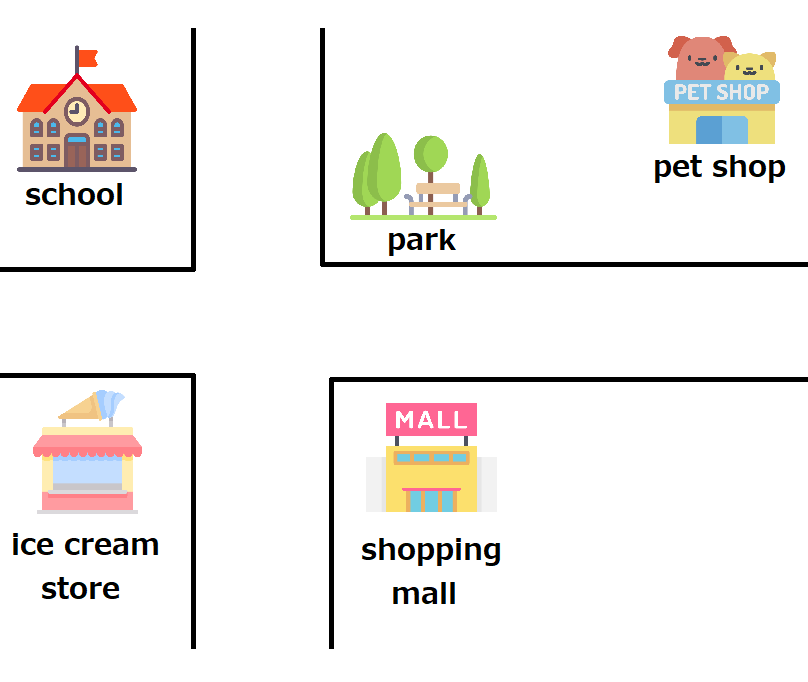
| 5. | Is there an ice cream store near the pet shop? | |
| (ペットショップの近くにアイス屋さんはありますか?) | ||
| Answer: | . |
PART E_7

| 6. | Are there a few cups in the cabinet? | |
| (棚の中にはいくつかのカップがありますか?) | ||
| Answer: | . |
PART E_8
Now, let’s review your answers.
では、あなたの答えを復習してみましょう。その後、修正したあなたの答えを読んでみましょう。
(Please review your student’s answers by sending the correct answers in complete sentences. After that, ask your student to read aloud his or her corrected answers.)
PART E_9
PART F_1
Now, you will ask me questions. I will check if your sentences are complete and if the grammar is correct.
今度は、あなたが講師に質問します。習った文法を使って文を作りましょう。
講師は文法と完全な文章であるかを確認します。
講師は文法と完全な文章であるかを確認します。
(Please send the sentences that need grammar corrections to your student.)
PART F_2
| Student: | ? | |
| Tutor: | Yes. I can bake a cake. | |
| Student: | ? | |
| Tutor: | I usually go to the supermarket on weekends. | |
| Student: | ? | |
| Tutor: | I cook eggs and rice for breakfast. | |
| Student: | ? | |
| Tutor: | I read books after work. | |
| Student: | ? | |
| Tutor: | Yes. I watch American TV shows. | |
| Student: | ? | |
| Tutor: | No. I can’t ride a bike. |
PART G_1
Let’s do a free talk about the following topic.
フリートークをしましょう。
(Please do a free talk if you have time left.)
PART G_2
Are there trees behind your house?
Is there a supermarket near your house?
Is there a supermarket near your house?
PART G_3
[Presentation] If we need to study foreign languages except English
PART A_1
In this lesson, you will give a presentation about the topic
“If we need to study foreign languages except English.”
Then, I will give you feedback after your presentation.
“If we need to study foreign languages except English.”
Then, I will give you feedback after your presentation.
このレッスンでは、英語以外の外国語を学習すべきであるかについて話しましょう。その後、講師がフィードバックをします。
PART A_2
(Please start your presentation now.)
プレゼンテーションを始めてください。
PART A_3
Thank you for your presentation. Now, I will give you feedback on your presentation.
(Please give feedback on your students presentation.)
PART A_4
Now, please answer the following questions related to the topic of your presentation.
次に講師がトピックに関連した質問をします。
PART A_5
| 1. | Why is studying a foreign language important? | |
| Answer: | . | |
| 2. | What are the advantages of studying two or more foreign languages? | |
| Answer: | . | |
| 3. | What are the disadvantages of studying two or more foreign languages? | |
| Answer: | . | |
| 4. | Should all students be required to study two or more foreign languages? | |
| Answer: | . |
PART B_1
Now, I will start my presentation about the same topic. Please ask me some questions about it later.
今度は講師が同じトピックについて話します。終わったら講師に質問をしましょう。
PART B_2
English is one of the most popular languages to study. On the other hand, there are other languages spoken by many people around the world. Based on data, Mandarin Chinese is spoken by most people. Spanish comes second, while English comes third on the list.
To know if a person should study other foreign languages except English depends on his or her purpose for studying. If one’s purpose is to study or work in an English speaking country, then studying the English language is enough. But, if one plans to visit several countries across the globe, he or she should consider learning other languages such as Mandarin Chinese and Spanish. The ability to speak many languages is also important in business. If one intends to do business with foreigners, then studying the most spoken languages such as Mandarin, Spanish, and English will contribute a lot to the goal.
Studying a foreign language will take a lot of time, effort, and money. And so, it is important to think about it carefully before deciding to do so.
PART B_3
Do you have any questions about my presentation?
PART B_3
| 1. | ? | |
| 2. | ? | |
| 3. | ? | |
| 4. | ? |
PART B_4
Travel Beginner -Traveling
LESSON GOAL
Let’s check our lesson goal.
In this material, you will learn English expressions that can be used when traveling and practice them.
In this material, you will learn English expressions that can be used when traveling and practice them.
このレッスンのゴールを確認しましょう。
この教材では、旅行するときに使う英語を練習をします。
この教材では、旅行するときに使う英語を練習をします。
PART A_1
Please study the picture below. Then, I will ask you some questions.
イラストを見てださい。講師がイラストについて質問します。
PART A_2
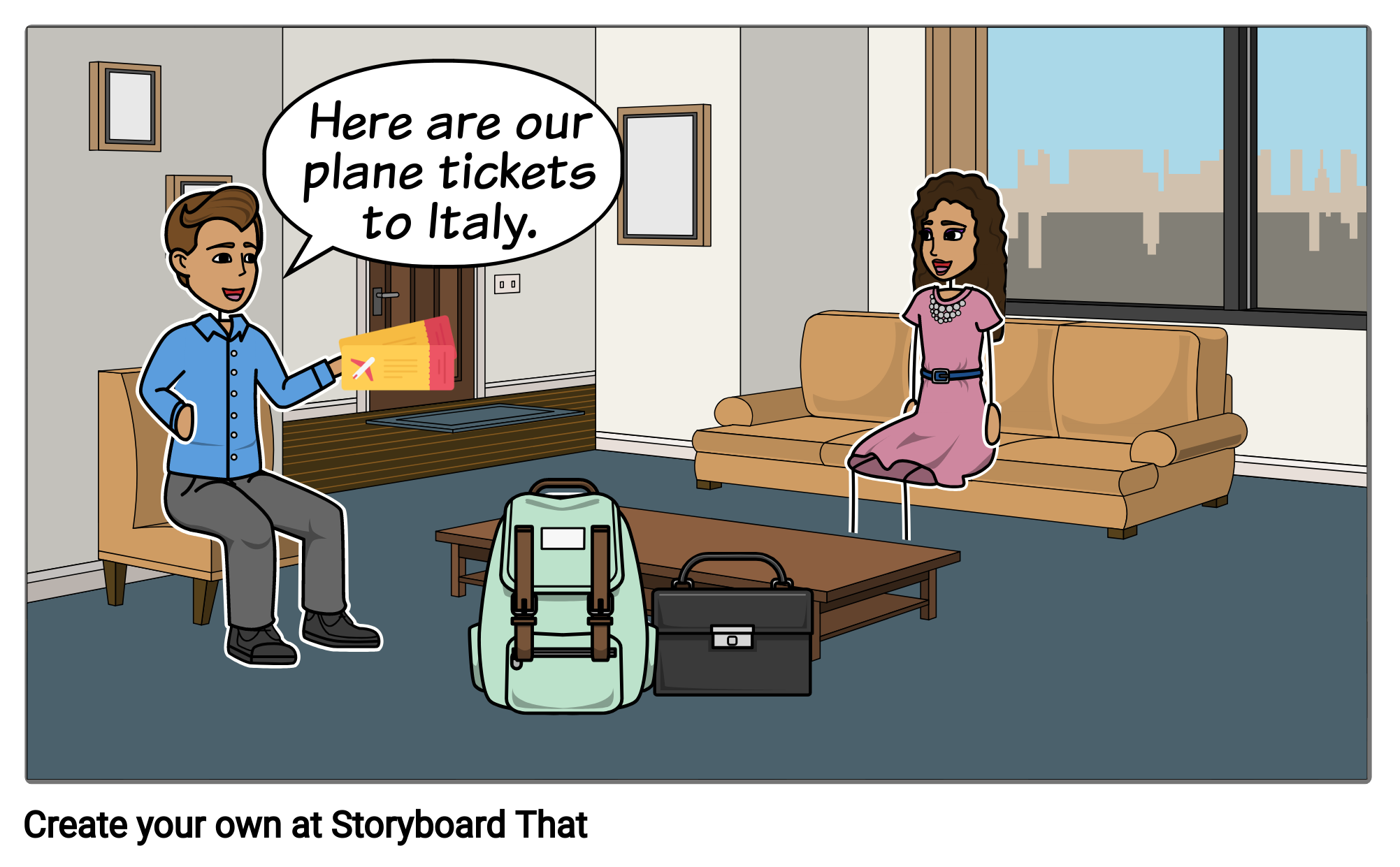
| 1. | How many people are there? |
| Answer: | |
| 2. | Where are they going? |
| Answer: |
PART A_3
Now, let us review your answers.
では、あなたの答えを復習してみましょう。その後、修正したあなたの答えを読んでみましょう。
(Please review your student’s answers by sending the correct answers in complete sentences. After that, ask your student to read aloud his or her corrected answers.)
PART B_1
Now, let us read aloud the following sentences. Please repeat after me.
次に文章を音読しましょう。講師につづいて読みましょう。
PART B_2
| 1. | My flight is on ~ | |
| 2. | What places will you visit in ~ | |
| 3. | I will visit ~ |
PART C_1
Let us read the dialogue. I will play Rose and you will play Ron. After reading it once, we’ll switch roles.
会話文を読みましょう。最初に講師がRose、あなたがRonの部分を読みます。終わったら交代しましょう。
PART C_2
| Rose: | Hi, Ron. I heard that you are going to Italy. When is your flight? | |
| Ron: | Hi, Rose. My flight is on October 14. | |
| Rose: | I see. What places will you visit in Italy? | |
| Ron: | I will visit Rome and Venice. I’m really excited! | |
| Rose: | That is amazing! How much is the plane ticket? | |
| Ron: | It costs about $800. |
PART D_1
Please answer the questions based on the dialogue.
会話文に関する質問に答えましょう。
PART D_2
| 1. | Where is Ron going? |
| Answer: | |
| 2. | How much is the plane ticket? |
| Answer: |
PART D_3
Now, let us review your answers.
では、あなたの答えを復習してみましょう。その後、修正したあなたの答えを読んでみましょう。
(Please review your student’s answers by sending the correct answers in complete sentences. After that, ask your student to read aloud his or her corrected answers.)
PART E_1
Let us complete the sentences in the dialogue. I will play Rose and you will play Ron.
空欄を埋めて会話文を読みます。講師はRose、あなたはRonのパートを読みましょう。
PART E_2
| Rose: | Hi, Ron. I heard that you are going to Italy. When is your flight? | |
| Ron: | Hi, Rose. My __________ is on October 14. | |
| Rose: | I see. What places will you visit in Italy? | |
| Ron: | I will __________ Rome and Venice. I’m really excited! | |
| Rose: | That is amazing! How much is the plane ticket? | |
| Ron: | It __________ about $800. |
PART E_3
Now, let us review your answers.
では、あなたの答えを復習してみましょう。その後、修正したあなたの答えを読んでみましょう。
(Please review your student’s answers by sending the correct answers in complete sentences. After that, ask your student to read aloud his or her corrected answers.)
PART F_1
Now, I will ask you some questions. Please answer in complete sentences.
講師が質問をします。文章で答えましょう。
PART F_2
| 1. | Are you afraid of riding a plane? |
| Answer: | |
| 2. | Have you been to other countries? |
| Answer: | |
| 3. | What country would you like to visit with your friends? |
| Answer: | |
| 4. | Do you want to travel alone? |
| Answer: | |
| 5. | Where do you want to go next summer? |
| Answer: |
PART F_3
Now, let us review your answers.
では、あなたの答えを復習してみましょう。その後、修正したあなたの答えを読んでみましょう。
(Please review your student’s answers by sending the correct answers in complete sentences. After that, ask your student to read aloud his or her corrected answers.)
REVIEW AND FEEDBACK
Now, let us review the things that you learned in this lesson.
ではこのレッスンで学んだことを振り返りましょう。
(Please give a short feedback on how your student did on your class.)
| Grammar 文法 |
Pronunciation 発音 | Vocabulary 単語 |
Comprehension 理解 |
|
|---|---|---|---|---|
 GOOD GOOD |
文法の誤りはほとんどなく、完全な文章で話すことができる | ほとんどの単語をはっきりと正しく発音することができる | 習った表現を適切に使うことができる | 文章を理解し、質問に正しく答えることができる |
 FAIR |
文法の誤りはあるが、完全な文章で話すことができる | 発音の練習が必要な言葉がいくつかある | たまにミスはあるが、習った表現を適切に使うことができる | 文章を完全に理解するのは難しく、質問に正しく答えられないときもある |
 POOR |
文章で話すのは難しく、単語だけで話すことができる | 発音の練習が必要である | 習った単語と表現を少しだけ使うことができる | 文章を理解するのは難しく、質問に答えるのは難しい |
レッスン教材に関するアンケートのお願い
レッスン教材の改善・拡充を図ることを目的とし、アンケートを実施しております。
以下のURLからアンケートにお答えいただき、 ご意見・ご要望をお聞かせください。
アンケートはこちら

